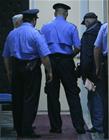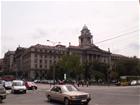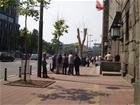Ratko Mladic – just a small piece and you are in the EU?
Dessislava Dimitrova, May 28, 2011
 Has he really been arrested and why there is no such information in the Serbian media. This was my first thought in the morning of May 26, when I saw an article in Croatian media, titled Ratko Mladic Arrested in Serbia? At this moment I was in Belgrade, so my first reaction was to switch on the TV to see if there would be any announcements on this issue. There were soap operas running on most of the channels, while on the websites of Serbian media the main topic was the forthcoming visit of Catherine Ashton to Belgrade. On the website of the Serbian Interior Ministry there were pieces of information on the latest police activities, some announcements about Serbia's Internal Minister and Deputy Prime Minister Ivica Dacic's meeting with Ashton and his Croatian counterpart later in the day.
Has he really been arrested and why there is no such information in the Serbian media. This was my first thought in the morning of May 26, when I saw an article in Croatian media, titled Ratko Mladic Arrested in Serbia? At this moment I was in Belgrade, so my first reaction was to switch on the TV to see if there would be any announcements on this issue. There were soap operas running on most of the channels, while on the websites of Serbian media the main topic was the forthcoming visit of Catherine Ashton to Belgrade. On the website of the Serbian Interior Ministry there were pieces of information on the latest police activities, some announcements about Serbia's Internal Minister and Deputy Prime Minister Ivica Dacic's meeting with Ashton and his Croatian counterpart later in the day.
Was it possible that Croatian media who were in Belgrade to cover the visit of their interior minister, got the news from somewhere? I tried to reach some colleagues in Serbia, most of them were busy checking the information as I found out later. First to announce the news among local media was the tabloid Press but it was also quoting Croatian media. By the time it was already 12 local time – time for the noon news of the state-run RTS TV broadcaster. And again: Ashton is coming to Belgrade, a tornado in the USA, the weather forecast. Somewhere before or after the weather forecast, I am not quite sure, the presenter mentioned with one sentence that  Milorad Komadic, for whom the police suspects to be Ratko Mladic, was arrested. That was all.
Milorad Komadic, for whom the police suspects to be Ratko Mladic, was arrested. That was all.
In the meantime, the news spread globally, although nobody in Belgrade has formally confirmed it. It also became clear that President Boris Tadic is having a breaking news conference at 1 p.m. local time. Somewhere about 1.10 Tadic confirmed in front of the journalists in Serbian and English that Mladic had been arrested in Serbia and declined further details, saying that they would be disclosed by the police.
I do not know whether the number of questions was limited in advance, but they were just a few. When asked whether the Tribunal in the Hague was informed about Mladic’s arrest, Tadic, obviously nervous, said: “Now I am informing you - the media.” He also declined to comment whether the arrest had anything to do with Ashton’s visit to Belgrade, but said only that this day it became clear that the country was keeping its promise to cooperate with the Hague Tribunal and pledged that all major crime organisers would be arrested by the end of the government’s mandate.
 Just after Tadic’s speech the first details on the arrest came. According to them, Mladic was arrested at his cousin’s place in the village of Lazarevo, in the northeastern part of the country; that he did not resist, although he had two pistols with him, but was not disguised like Radovan Karadzic, for example, who was wearing long hair and a beard when he was caught. Mladic’s first photographs show that he has obviously lost weight, and according to his lawyer, his hearing was brought off as he was in a hard psychical condition and was not able to put a whole sentence together (which according to local media means that he has suffered several brain strokes.)
Just after Tadic’s speech the first details on the arrest came. According to them, Mladic was arrested at his cousin’s place in the village of Lazarevo, in the northeastern part of the country; that he did not resist, although he had two pistols with him, but was not disguised like Radovan Karadzic, for example, who was wearing long hair and a beard when he was caught. Mladic’s first photographs show that he has obviously lost weight, and according to his lawyer, his hearing was brought off as he was in a hard psychical condition and was not able to put a whole sentence together (which according to local media means that he has suffered several brain strokes.)
In the afternoon, when we were supposed to leave Belgrade, there was nothing  extraordinary in the streets until the moment when I a guy screamed from a car passing nearby “Ratko, don't give up!” and we started noticing the enhanced presence of police and gendarmerie, as well as TV crews in front of the Presidency. While we were traveling, more news continued to come up on the radio. It became clear that around 4 p.m. local time, three cars, one of which was taking Mladic, stopped in front of the war crimes tribunal in Belgrade. Thus, the information that he was extradited to the Hague the same day were dismissed.
extraordinary in the streets until the moment when I a guy screamed from a car passing nearby “Ratko, don't give up!” and we started noticing the enhanced presence of police and gendarmerie, as well as TV crews in front of the Presidency. While we were traveling, more news continued to come up on the radio. It became clear that around 4 p.m. local time, three cars, one of which was taking Mladic, stopped in front of the war crimes tribunal in Belgrade. Thus, the information that he was extradited to the Hague the same day were dismissed.
A bit later, according to the radio, tens of people gathered to protest in Belgrade’s central square and that more protests were planned in other places across the country. The information will continue to bubble and there are more reactions and comments to come yet. One of the first comments I saw after the arrest was „EU, samo Komadic i tamo si” (it is a game of words, as “komadic” in Serbian means a small piece, a particle and translated it means: “EU, just a small piece and you are there” - after a TV commercial. Whether this would help to assemble the jigsaw puzzle it is yet too early to say.
The events of May 26 remind a lot the arrest of Croatian General Ante Gotovina, who several weeks ago has been sentenced to 24 years in jail by the Hague Tribunal, nearly six years after he was arrested. The former ICTY chief prosecutor, Carla del Ponte, announced his arrest during ... her visit to Belgrade, while now the news for Mladic’s arrest came first from Zagreb.
 Without getting into any conspiracy theories, the pieces from the jigsaw puzzle seem to have been assembling themselves. Gotovina was arrested in December 2006 on the Canary Islands, two months after the official launch of Croatia’s EU membership talks. Now, almost six years later, the end of the talks seems to be even harder than the start. Because the cooperation with the Hague Tribunal is just one of the EU accession conditions.
Without getting into any conspiracy theories, the pieces from the jigsaw puzzle seem to have been assembling themselves. Gotovina was arrested in December 2006 on the Canary Islands, two months after the official launch of Croatia’s EU membership talks. Now, almost six years later, the end of the talks seems to be even harder than the start. Because the cooperation with the Hague Tribunal is just one of the EU accession conditions.
At the same time the answer to the question “What has been happening in Belgrade lately” was quite often: “Nothing extraordinary, just the usual arrests for corruption.” Until the arrests for corruption continue, the arrest of a war criminal does not change the situation much. Yes, it shows political will, maybe means stability, maybe the state funding that was spent on the search for Mladic could have been spent for other things, the case with Croatia and even with Bulgaria and Romania is an example that “showing muscles” is in vain if there are no particular results.